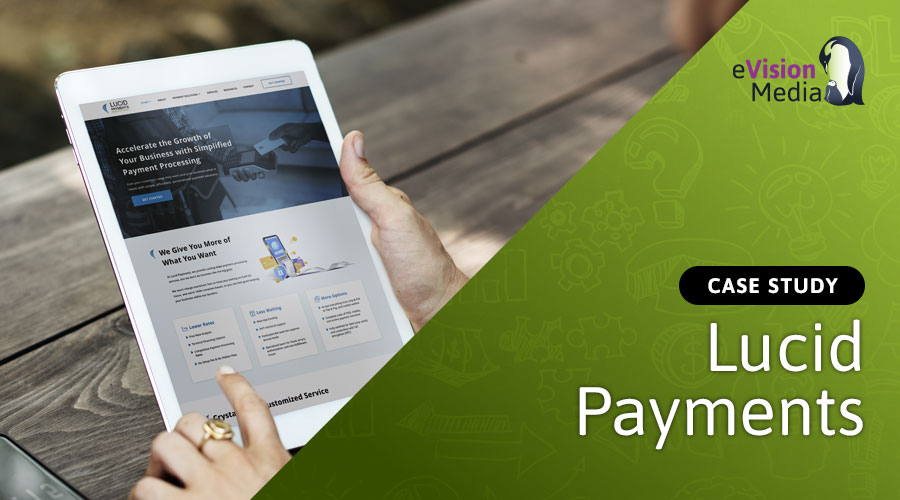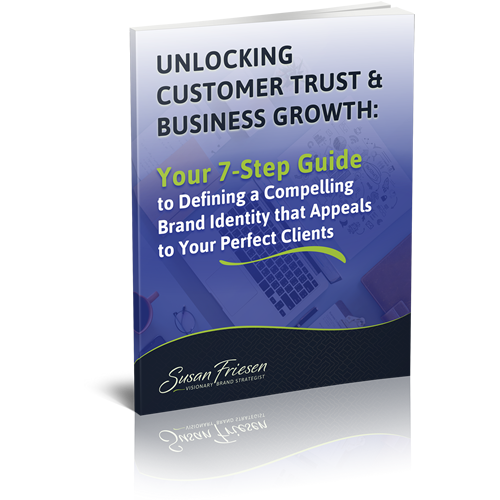A Case Study on Lucid Payments
In late 2021, the founder and CEO of Lucid Payments, Surge Cumiskey, contacted us looking for help with her website.
She was disappointed with the one she had at the time, and unimpressed with the lacklustre services she was receiving from the agency that built it.
What’s more, she needed to create a brand that would be able to stand out amongst a massive crowd of giants, including the big banks, which dominate the payment processing industry.
Needless to say, trying to make such a scrappy little brand stand out against the likes of Moneris, PayPal, and Square was no small feat.
Fortunately, Surge is quite the visionary and she had already been working on her brand for years before she ever reached out to us, so she knew what she wanted.
Surge wanted to create a brand that would provide people with a better price, better service, and greater clarity, while working to protect the best interests of business owners and being bold enough to call out the nonsense going on in the payment processing industry in no uncertain terms.
That being said, by the time we heard from her, Lucid Payments already had a website, logo, tagline, and more, but its branding needed some work if it was ever going to resonate with the right audience.
Luckily, I love a challenge, and I love working with clients like Surge, who already have a vision for their brand and just need a little help getting there, so I was incredibly excited to start this project.
With that in mind, in early 2022, we got started on building Lucid Payments’ new SEO-optimized website, planning its content marketing strategy, and revamping most of its branding.
And now, after more than two years, Surge’s monthly article and newsletter are still going strong, and are continuing to solidify her brand positioning, as we look at ways to expand her audience even further.
So, if you’re looking to learn more about defining brand positioning, developing a brand, or the kind of visionary branding we offer clients, then I hope you take the time to keep reading.
WATCH: Harnessing the Power of Brand Positioning: A Five-Part Video Series for Small Business Owners
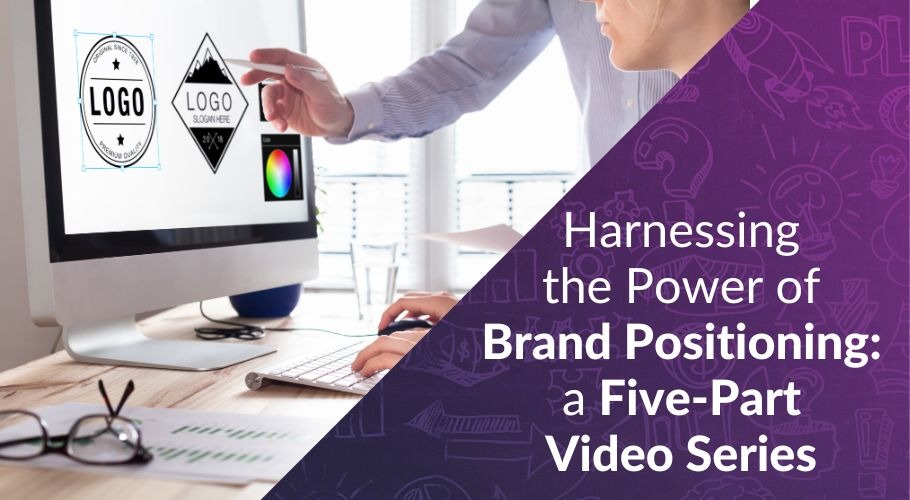
If you’re trying to create a brand and you want it to be successful, there’s a long list of things to consider and a lot that you need to know.
That being said, when it comes to brand building, one of the most important things to understand is brand positioning, which refers to how your brand is positioned in relation to your competitors.
So, if you’re looking to build a brand, then this video series is for you. It’ll give you a crash course on the various aspects of your brand positioning, including its visual and visceral impacts.
Website
When Surge first reached out to us, her website was suffering from the same trite and tired branding that many businesses attempt to employ.
It droned on and on about Lucid Payments and how great its products and services were while ignoring its audience and its problems, pain points, needs, and desires.
For example, on their old website, the main heading simply said, “Lucid Payments”, which was already a redundancy with their logo up at the top.
Then the subheading said something like, “Lucid Payments is a leading provider of technology-driven payment processing solutions for small to large enterprises in the point-of-sale, B2B and e-commerce industries,” and that’s just one of four paragraphs.
Notice that there wasn’t one mention of the customer or anything they might be dealing with here. The words you and your were nowhere to be found. Everything was just about how great Lucid Payments is.
But the fact of the matter is this type of branding just doesn’t work; at least not anymore.
The trust of consumers is getting harder and harder to earn, and they want to know that the brands with whom they’re doing business understand them, know what they’re going through, and can help to fix their problems or in some way enhance their lives or make them more convenient.
In other words, they don’t care how great your brand is. They want the focus to be solely on them and what you can do for them.
With that in mind, as you can see from the screenshot below, we rewrote the website’s heading and subheading to be all about the needs and wants of potential customers.
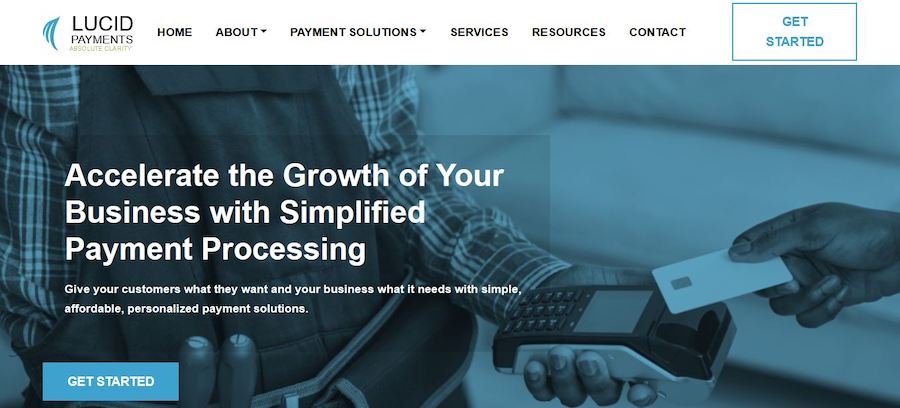
Instead of focusing on Lucid Payments, these headings let potential customers know that:
a) This company can help them accelerate the growth of their business.
b) Lucid Payments makes things easier for them by offering simplified payment processing.
c) The services Lucid offers are affordable, personalized, and can help them give their customers more of what they want.
This is much more effective, as it takes the focus off of Lucid Payments and positions this brand as one that understands what business owners are dealing with, as they’re speaking directly to them about their businesses and the problems they might be experiencing.
Moreover, Surge’s website included a ton of unnecessary information that would be of little to no interest to those who want her services.
It even included all the specifications of the payment terminals directly on the Home page, right down to the weight, dimensions, and ideal temperature range of each terminal.
This had to be changed, as this sort of thing was not going to get them any business, much less do anything to differentiate them.
So, aside from rewording the heading and subheading, we also analyzed everything that was on Surge’s website, removing or condensing anything that wasn’t absolutely necessary.
On the Home page, we got rid of any mention of the terminals, omitted the overly technical information, and moved the rest of that info to an inside page for those who might want to know.
As you can see below, we moved all references to payment terminals to Lucid’s new In-Store and Mobile Payments page, which summarizes these products and services, including a brief description of each payment terminal.
What used to take up a third of their Home page has now been condensed down to a few paragraphs, and the descriptions of the terminals now put a focus on what potential customers can do with these products, instead of just talking about how great they are.
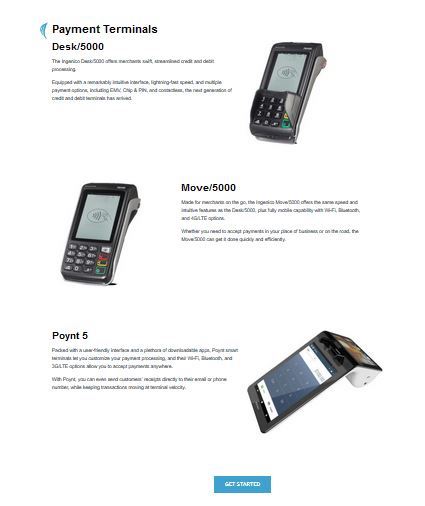
What’s more, there were also a lot of things listed on Surge’s old website that were either ideas that didn’t get off the ground, or things that Lucid Payments just didn’t do anymore.
That being said, we removed anything that didn’t need to be there, shortened all the text as much as we possibly could, and cleaned up their navigation, which was an absolute mess, with nearly two dozen different options, many of which were redundant or irrelevant.
At any rate, the navigation is now much easier to use, and much less convoluted, which was necessary to ensure their website aligned with their branding, which promises “Absolute Clarity”.
In addition, we got rid of any jargon and made everything as easy to understand as possible, which is incredibly important to Lucid’s brand positioning, as it’s all about giving business owners greater clarity, and many other brands are not attempting to do this.
As you can see below, we also made sure to include nods to Lucid’s brand positioning throughout the Home page, pointing out that Lucid Payments is 100% Canadian-based, doesn’t “do business like the big guys” and has lower prices and better customer service.
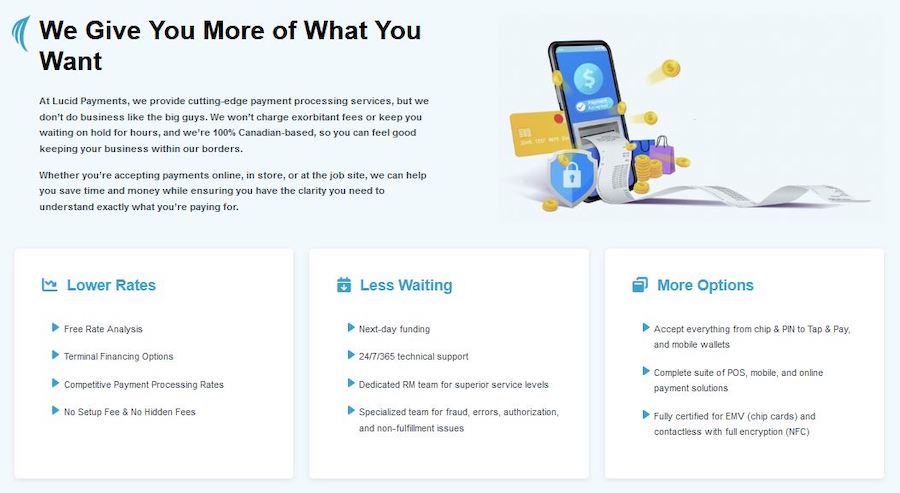
For those who want to know more, we went into even greater detail about Lucid Payments on the About page, including why people should choose Lucid, its mission statement, and of course, its values.
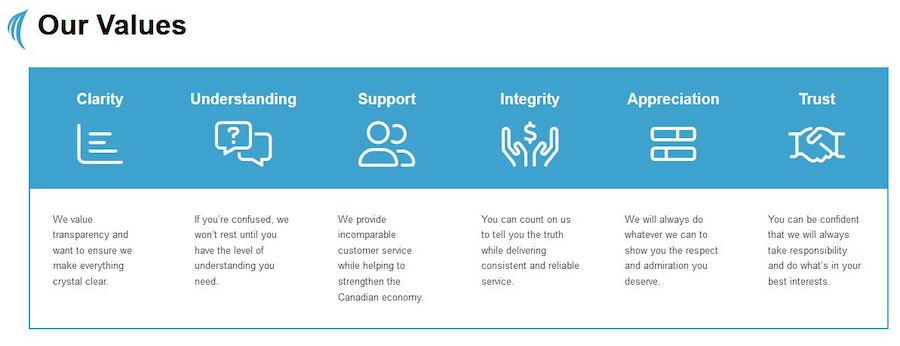
Among other things, this new focus on potential customers, and the unique aspects of its values being displayed prominently on its website, has allowed us to position Lucid Payments as one of the most unique, desirable, and disruptive brands in the payment processing industry.
All things considered, this has got to be one of the more challenging projects I’ve worked on over the years, but in the end, Lucid Payments’ branding is now much more effective, and it’s been great to see them continue to succeed and stand out in an industry dominated by massive corporations.
Content Marketing
As far as I’m concerned, Surge’s content marketing is where her brand truly shines.
Not only does she work with us to communicate directly with her audience through Lucid Payments’ monthly newsletter, but she can also speak frankly about all the nonsense going on in the payment processing industry, like the ongoing controversy surrounding interchange rates.
She does this by letting business owners know what to watch out for, informing them of things that they should know about, and offering practical advice that you’re not likely to get from her competitors, like how to actually save money on payment processing.
As you can see, Lucid’s blog offers a wide array of content related to payment processing, including everything from analysis of trends and new technologies to letting business owners in on how they can protect themselves and their customers from fraud.
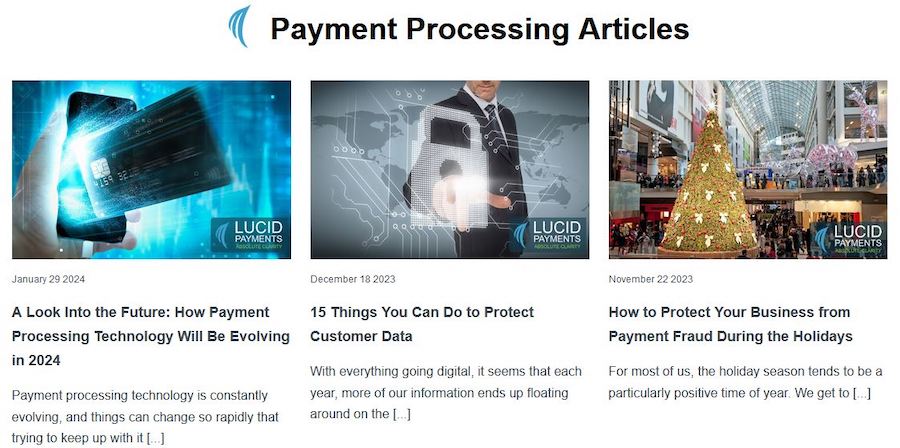
But these are just a few examples of the content covered by Lucid Payments, which often deals with controversial, hot-button issues in the world of payment processing.
Some of the articles have attempted to dispel common myths and misconceptions about payment processing, like the idea that bigger companies can provide more secure payment processing or lower prices.
For example, the article below details several data breaches that have affected the payment processing industry, dispelling the notion that bigger processors have better security when in reality, they’re actually the biggest targets.
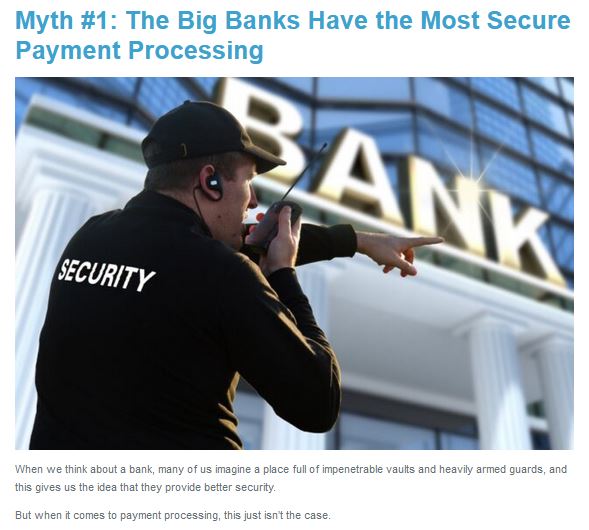
Not content to simply criticize her own industry, Surge has also made a point of calling out the government for its lack of action on things like interchange rates, which are incredibly high in Canada compared to other areas of the world where they’ve been capped.
As you can see below, she refuses to mince words, criticizing the Canadian government for its inaction and posturing on this issue.
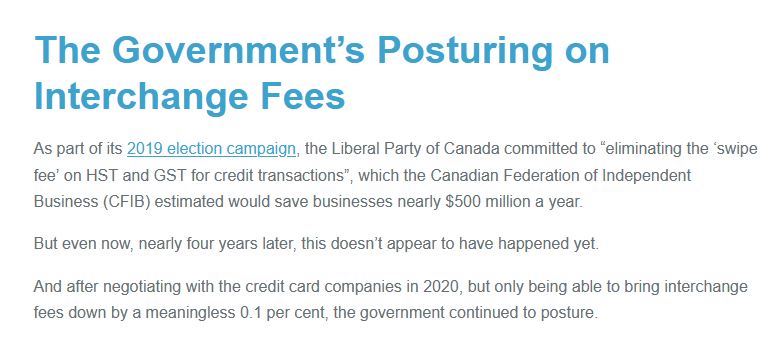
In another article on how to save money on credit card processing fees, she goes so far as to call her industry “convoluted and deceptive” before going on to provide practical advice on how merchants can save money on their payment processing.
As part of that advice, Surge even suggests incentivizing customers to use cash when they can, which certainly isn’t going to make her any money, but it shows the authenticity of her commitment to protecting the best interests of business owners.
Some may call this type of content distasteful or sensational, but Surge’s complete, unabashed honesty about the payment processing industry aligns perfectly with her brand positioning, and it’s one of the main reasons why it works so well.
Truth be told, Lucid Payments is publishing things that other payment processors wouldn’t be caught dead saying, and providing realistic advice that their competitors would rather see buried.
This may seem counter-productive, but this is the sort of thing that has allowed Lucid Payments to be positioned as one of the most authoritative and trustworthy brands in payment processing.
And after more than 20 years of helping business owners build their brands, I can honestly say that Lucid Payments offers one of the best examples of brand positioning in action.
Looking to create a brand, but need help bringing your vision to fruition? Contact us today to find out more about how we can help.
To your business success,
Susan Friesen
P.S. If you liked the article, you might want to subscribe to our newsletter. We publish tons of valuable content to help you learn more about marketing, and subscribing is the best way to ensure you don’t miss out. Additionally, if you’d like to learn more about building a search engine optimized website, click here for our free website guide.
